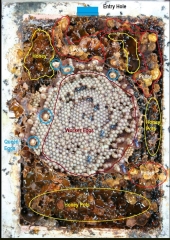




Permaculture is a gestalt ... a study of the whole. Not just how to produce more and better food, but how human life on the planet affects and is affected by the surrounding environment.
Bill Kearns




 1
1




Bill Kearns wrote:Beekeeper says that typically the grower gets the benefit of pollination and the beekeeper gets the honey.
find religion! church
kiva! hyvä! iloinen! pikkumaatila
get stung! beehives
be hospitable! host-a-hive
be antisocial! facespace








"We're all just walking each other home." -Ram Dass
"Be a lamp, or a lifeboat, or a ladder."-Rumi
"It's all one song!" -Neil Young




Permaculture is a gestalt ... a study of the whole. Not just how to produce more and better food, but how human life on the planet affects and is affected by the surrounding environment.
Bill Kearns




 What sort of beehive did you buy?
What sort of beehive did you buy?



Learn permaculture beekeeping from your home! You can find it here at :
organiclifeguru.com/course/beekeeping-101-organic-natural-traditional/




Best luck: satisfaction
Greatest curse, greed




Thekla McDaniels wrote:Recently I asked what that standard percentage is, and the answer was vague, and "you'll be getting more than enough honey".
I have a friend who allowed bees at her place, and received only one quart of honey. The beekeeper saying "Oh, I sold all of it".
So, here I am checking to see if there is a standard landowner percent.




Learn permaculture beekeeping from your home! You can find it here at :
organiclifeguru.com/course/beekeeping-101-organic-natural-traditional/




Pecan Media: food forestry and forest garden ebooks
Now available: The Native Persimmon (centennial edition)





find religion! church
kiva! hyvä! iloinen! pikkumaatila
get stung! beehives
be hospitable! host-a-hive
be antisocial! facespace
 1
1




Best luck: satisfaction
Greatest curse, greed

| I agree. Here's the link: http://stoves2.com |




